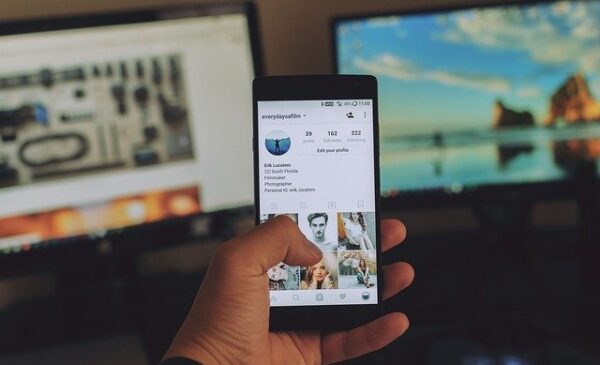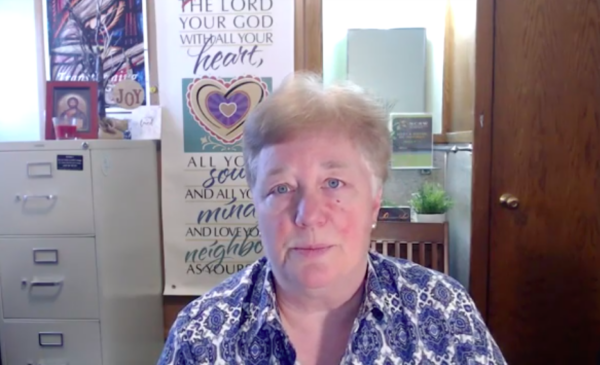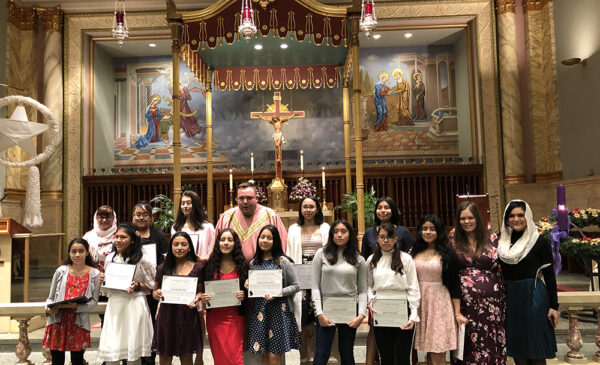BEDFORD-STUYVESANT — Social media use is nearly universal among teens. But for young women, what they might see displayed on their smartphone screen could be dangerous.
That’s because within the many sides of social media, especially on popular apps like TikTok, there is an ongoing theme of normalizing unhealthy relationships with food. One trending social media challenge was called “the headphone challenge” which asked TikTok users to try and wrap their headphone cord around their waist in order to portray a flat, skinny torso.
College senior Emily Jones says not all content creators are created equally and that even the blogging website Tumblr has been linked to “fitness” and health accounts that created harmful agendas.
The college student majors in neuroscience at Furman University in South Carolina and is also a staff writer at the online magazine for college women, HerCampus.
“People must take responsibility and understand that promoting and normalizing disordered eating habits on a platform with children as young as 12 and 13 is incredibly toxic,” Jones wrote.
“Even worse is the fact that eating disorders are known to be incredibly competitive,” she continued. “So, commenting that you skip meals and barely eat may make someone with an eating disorder even further reduce their caloric intake.”
TikTok Safety Policy Manager Tara Wadhwa has addressed multiple issues, including body positivity, on the company’s website.
“As a society, weight stigma and body shaming pose both individual and cultural challenges, and we know that the internet, if left unchecked, has the risk of exacerbating such issues,” Wadhwa said. “That’s why we’re focused on working to safeguard our community from harmful content and behavior while supporting an inclusive — and body-positive — environment.”
The pandemic effect
The pandemic has uprooted the daily routine of teenagers and young adults across the country. Instead of actively commuting to campus or participating in after-school programs, they have had to follow strict safety guidelines. On the flip side, being confined meant students were forced to stay connected through a variety of devices that have become central to navigating their academic and personal life. That meant a lot more screen time.
The Mary Louis Academy (TMLA) School Psychologist Christina Sama-Bommarito said the pandemic has affected her students in a variety of ways. As hybrid learning was reincorporated into their school schedule, once it was deemed safe, she noticed one thing: weight gain.
“One thing we can’t deny about COVID is the weight gain that many of us have put on because we don’t have that movement anymore throughout our day,” the counselor from the Jamaica Estates high school said. “We’re so confined to a space. I’ve been hearing a lot of girls who have come back to remote learning and have put some weight on. That has been damaging to their self-esteem in general.”
She equated social media to a double-edged sword for a teen that could either be used to weaponize the person on the other side of the screen or provide a supportive community. It all depends on their mindset at the time they access the content.
Teens credit online platforms with several positive outcomes. According to a Pew Research Study, they say social media helps strengthen friendships, exposes them to different viewpoints, and helps people their age support causes they care about. Roughly eight-in-ten teens ages 13 to 17 said social media makes them feel more connected to their friends’ lives.
“If they’re in a negative mindset, then social media is going to hinder their self-esteem and their self-confidence because they’re going to kind of go down this rabbit hole,” Sama-Bommarito said. “If they’re in a positive mindset, social media can be a helpful outlet to them. I think it ultimately depends on the student themselves.”
Armed with the knowledge and resources to promote body positivity amongst its students, TMLA started the Hilltopper Wellness Initiative in February 2021. Every day of the week, there is a themed activity that aims to have students match their internal beauty with their external beauty. For example, there’s Meditation Monday; Toolkit Tuesday; Wellness Wednesdays, which focuses on dietary wellness; Tranquil Thursdays, which incorporates faith and religious topics; and Frolic Fridays, which includes fun activities that help build student self-esteem and self-confidence. On a recent Frolic Friday, students took to TikTok and did a fun dance that enforced happiness.
“The idea was formulated to offer further resources to our community that enhance our psychological and emotional well-being,” Sama-Bommarito said. “Social media glamorizes a lot of things. We think there’s this image of a perfect person and we try to aspire to that when really that doesn’t exist.
“We talk about different ways to build self-esteem and self-worth and how you can keep that mindset throughout the most challenging times, which is now, which is what we’re in.”
TMLA sophomore Breann Elder said the school’s wellness initiative has helped with her self-image, self-worth, and mental health. Toolkit Tuesday is her favorite day of the program. She said it helps her come up with coping mechanisms when she’s stressed, overwhelmed, or needs to boost self-esteem.
“I like to journal, I like to do my makeup and skincare, because that all makes me feel so much better about myself,” she said. “Being a young woman, you’re so influenced by everybody else and what you see.”
For Elder, she’s dealing with a lot of paranoia when it comes to school and the pandemic. Yet even throughout the time of uncertainty, she credited one special relationship that has always helped keep her grounded.
“I speak on behalf of a lot of girls at TMLA that having a good relationship with God does make you feel better about yourself,” she said. “I feel right now that He’s grounding me and He’s my rock right now.”
She takes the time to build her relationship with Him through prayer, usually before she sleeps. She expresses freely from her heart words of gratitude – for her health, the people in her life, and her blessings.
“I don’t say a specific prayer, I just speak from my heart,” Elder said. “Releasing it to God, that’s what makes me feel better because I know that He is there and He heard me and He’ll be the one to guide me.”
When it comes to being a strong, faithful woman in Christ, there is another program dedicated to young women in the diocese called Daughters of the King.
Youth minister Christina Penaloza, at St. Sebastian’s Church in Woodside, is one parish that offers the program to teens. She said it’s a safe space for young women that allows them to gather, be honest, and open about vulnerable gender-specific topics during the crucial time when their bodies are changing.
“I feel that girls, especially, don’t have a reliable, honest, truthful resource to go to to talk about the issues we talk about,” Penaloza said. “There’s so much distortion with body image, with purity, with what’s truly important in a young girl’s life. They’re missing the whole teaching of glorifying the beautiful body that God has given them.”
The teens spend 10 weeks discussing in small groups topics like love, dating, sexuality, beauty, self-worth, chastity, and modesty. After the 10 weeks, the girls attend a special Mass with their family where they are presented with a certificate of completion. They also make a purity pledge to live out their life as a faithful woman of Christ.
“They renew their baptismal promises,” Penaloza said. “These are reminders for them when they have moments of temptation or moments of doubt and we tie it into their baptismal promise because that’s the root of our faith.”
Jessica Ortiz Reynoso was in the seventh grade when she completed the Daughters of the King program at St. Sebastian’s in 2017.
“When you’re in middle school, everyone cares about their experience because you’re going through your teen years,” she said. “Through Daughters of the King, it taught me appearance isn’t everything.”
Jessica is now a senior at Forest Hills High School. She recalled the different videos and lessons she learned years ago and hopes more girls can attend the program.
“When you’re born, God created you how He imagined it,” she said confidently. “God never makes mistakes when it comes to creating one person.”





